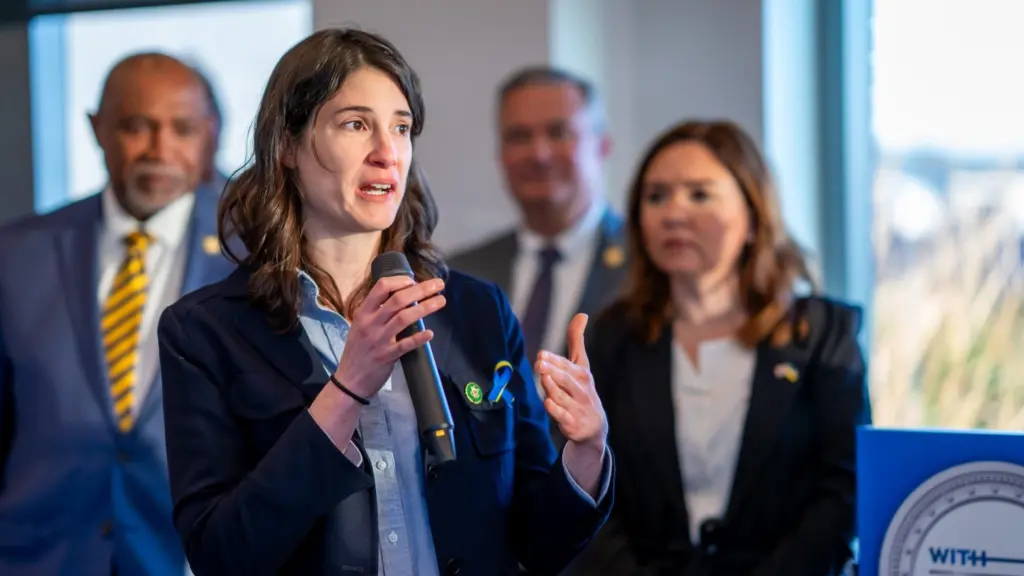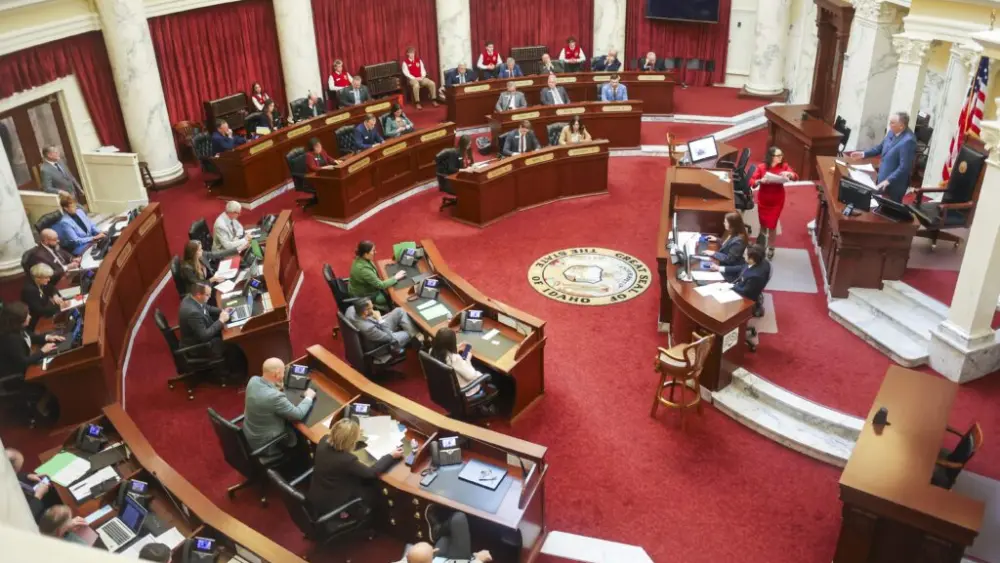WASHINGTON, D.C. – Marie Gluesenkamp Perez told voters in her 2022 campaign that she was “definitely not your typical candidate for Congress.”
After winning two consecutive U.S. House elections in Washington’s Republican-leaning 3rd Congressional District, she’s proven it.
Her willingness to cross up her party leaders and crossover to vote with the GOP majority was on display again this week in an episode that made some of her Democratic colleagues uneasy, others outright hostile.
Gluesenkamp Perez, of Skamania County in southwest Washington, authored a resolution reprimanding a retiring Democrat from Illinois for a political sleight-of-hand aimed at ensuring he is succeeded by his chief of staff.
House Minority Leader Hakeem Jeffries, D-New York, and pretty much everyone else in the Democratic caucus didn’t want the matter to reach the House floor.
It did. It wasn’t pretty. MGP — that’s how folks refer to her — found herself pitted against fellow Democrats enraged by her dogged pursuit of the public reprimand.
The resolution passed 236-183, thanks to the votes of 213 Republicans.
Gluesenkamp Perez isn’t second-guessing her move.
“Everyday people here in Southwest Washington and nationwide want representatives who will seek to build rather than destroy, who will listen and do the work rather than bask in celebrity, and who will focus on substance, not slogans or sound bites,” she wrote supporters in a fundraising email Wednesday.
The Standard spoke with Gluesenkamp Perez on Thursday to hear if there’s been any fallout and if the experience might have her rethinking her relationship with the Democratic Party.
The following interview was lightly edited for clarity and length.
What conversations have you had with other Democrats in the caucus, members of leadership, or those who spoke during the floor debate?
You know, while it might not have been audible on the cameras, the heckling was pretty intense. I don’t take it personally. You can’t. It’s too easy to, you know, sort of condemn people. While we can condemn the actions, you do not condemn the person as an individual. That is a different question.
Have you spoken with any fellow Washington state Democrats about the events and what did they say?
Kim Schrier did also vote for this reprimand. I was really encouraged by that. Everybody’s got to make their own determinations about how they can best serve their district.
Given what transpired, have you entertained thoughts of leaving the Democratic Party and becoming an independent?
I’m a Democrat, and that’s why I feel it’s important to hold my party accountable. I feel I am more in line with democratic values on this than the other side. So this is not a signifier to me that I need to change parties. I think the party needs to change. But that’s different. That’s long work, right?
It’s not causing you to rethink your relationship with the party?
No, I’m a Democrat. Maybe I’m an old school one. Old school Democrats aren’t dead yet.
Former Republican Congresswoman Liz Cheney, last year, when she endorsed Vice President Kamala Harris, spoke of the importance of putting country over party. I was thinking that maybe you were channeling that vibe a little bit Monday. Were you?
No. I wouldn’t say that I was thinking about any political figures during that. I was thinking about my neighbors and friends. I actually saw my grandparents and my parents right after the news broke about Representative [Chuy] Garcia. My family and my neighbors all had such moral clarity. I said, ‘Well, some people think that I’m out of my lane here, that I should just be thinking about timber and sea lions. Do you feel like I’m derelict in my duty to local issues here, if I go after this?’ And they said, ‘No, no. That is the reason that we care about timber policy in our schools. This is a natural consequence of that. Being rooted in place and local values does not end with just the material questions. It’s married to the values, the deeper values.
You’ve touched on this a little already. But what’s been the response of your constituents?
Look, people are not necessarily paying attention to Chicago politics, but they are broadly losing confidence in Congress. I mean, Congress’s approval rating is in the gutters. Part of my point in the debate is like what use is it to win an election at all costs, even your own integrity, when you destroy the thing itself? That there is a definition of a Pyrrhic victory.
What do you think would be different in the House if there were 218 Marie Gluesenkamp Perezes serving?
People were like, ‘Why are you picking this fight?’ And I was like, ‘Why are you picking this fight?’ Because the facts are pretty clear. I’m not here to condemn the character and the legacy of Chuy Garcia. I’m saying that it’s wrong to collect signatures and sign the petition for your chief of staff to run and withdraw after the deadline is over. That’s what I’m saying is wrong. Like, why do you need to pick this fight with me? The facts are the facts.
Sounds like you’re trying to hold up a mirror for your colleagues to see what others see is going on.
Change does not happen because of just condemnation. And grace is not just turning a blind eye. It is accountability and grace. Those things, that is where change can happen. And I’m not going to hold any grudges for anyone in this. I just did what I felt my community would want me to do, and that’s all I can do, is be faithful and humble.
They’ve got your back. That’s what you said.
I felt it. It’s been really awesome honestly. I know where my friends are, I know who elected me. That was a real encouragement to me that night after the debate, folks from back home texting me and knowing that people were praying for me. It was pretty necessary.
I did wonder, if you’re concerned that, given what’s happened, your party might not be on the right course to regain the majority and effectively lead.
I think it is an encumbrance on your ability to lead if you are not willing to hold your own accountable. I think the work at hand is too serious to move forward without addressing these failings, which is why I felt it was necessary to bring this resolution forward.
It was not fun, but I also think it’s important for the body. There were colleagues who were like, ‘She’s a lawmaker for God’s sake. Why didn’t she make a law?’ Well, I cannot think of every weaselly thing and make it illegal. What I can do is say that there’s a culture of accountability and that we’re willing to be honest brokers in upholding our values.
This story first appeared on Washington State Standard.





